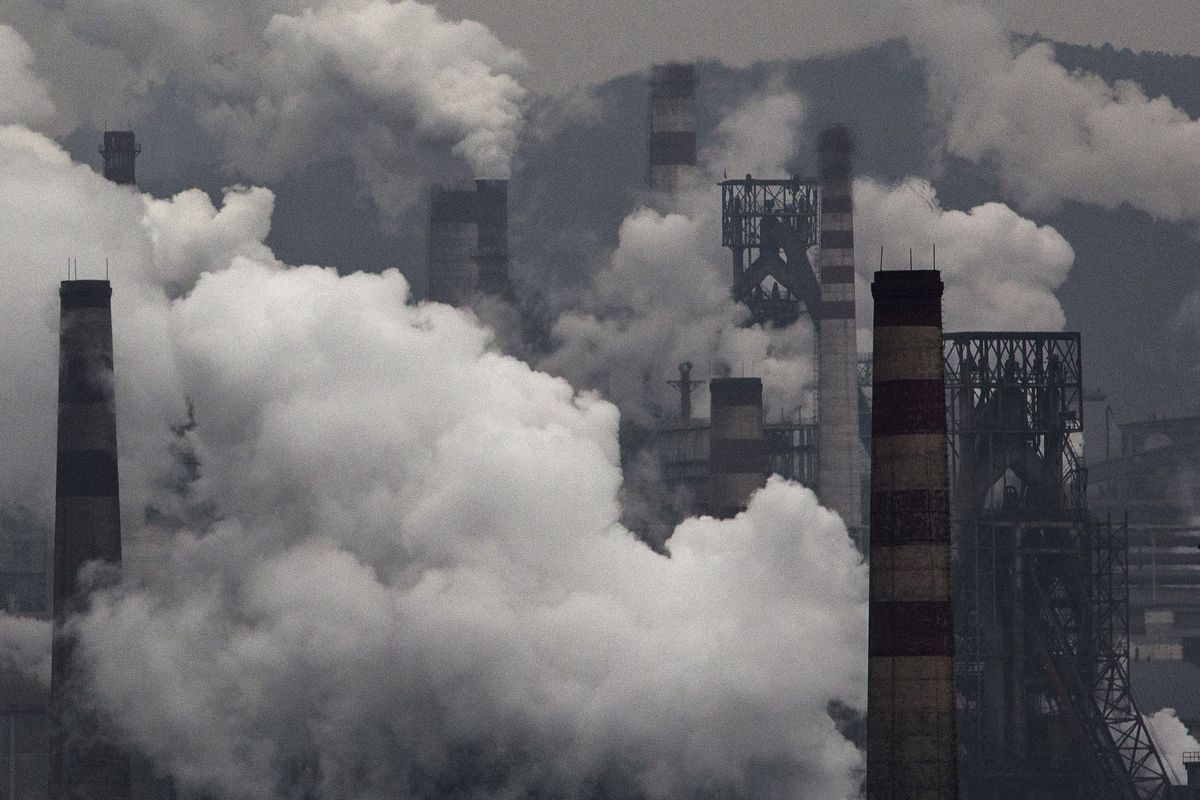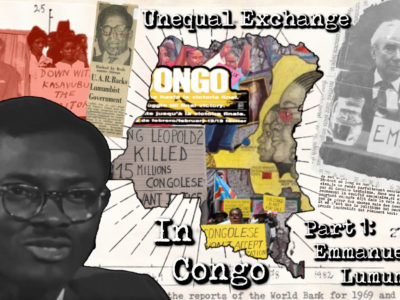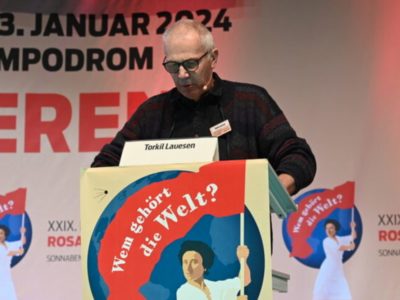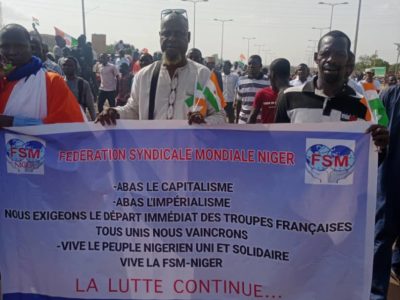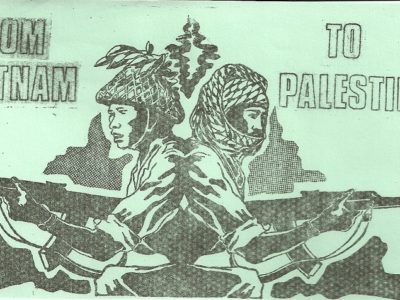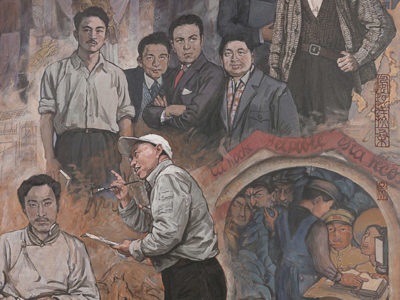This is the English version of an interview with Torkil Lauesen that I conducted for the German daily Junge Welt. Torkil Lauesen is a Danish antiimperialist whose book The Global Perspective: Reflections on Imperialism and Resistance has recently been published by Kersplebedeb. In 1991, Lauesen was sentenced to ten years in prison for his involvement in the so-called Blekingegade Group whose activities have been featured in the PM/Kersplebedeb release Turning Money into Rebellion: The Unlikely Story of Denmark’s Revolutionary Bank Robbers.
*
In 1991, you were sentenced to ten years in prison because of your antiimperialist activities. Now, 25 years later, you have written a book titled The Global Perspective: Reflections on Imperialism and Resistance. Has nothing changed?
Everything has changed in order to stay the same: The industrialization of the Global South and the global chains of production have intensified imperialism. Superprofits for capital have increased, while the prices for consumer goods in the Global North have decreased. U.S. hegemony has declined. We now live in a multipolar world with new powers emerging. So-called real socialism no longer exists, and national liberation movements have all but disappeared.
At the end of the 1980s, antiimperialism pretty much vanished from the left’s radar. Why?
National liberation struggles in the Global South subsided and neoliberalism ushered in a golden capitalist era. Furthermore, the talk about globalization concealed the ongoing reality of imperialism.
Was there no globalization?
Of course there have been drastic changes in capitalism in the last thirty years: innovations in transport and communications have altered the entire system of production and distribution. But very few have people have analyzed this in the context of the imperialist order. This is particularly odd considering the fact that globalization has made the imperialist system stronger, not weaker.
Did the so-called anti-globalization movement lack an understanding of imperialism?
The term “anti-globalization movement” is misleading. People were against a globalization from above. They had a global perspective, challenged dominant power structures, and brought socialist ideas back into political debate. But it is true that imperialism was largely absent from their analysis. This also meant that the movement wasn’t particularly radical. In the worst cases, it fueled reactionary tendencies: demands for strong nation states, an affinity with conservative factions of capital, and so on.
Is there an antiimperialist comeback today?
There is certainly renewed interest in antiimperialism. One only has to look at recent book releases, or at the articles published by Marxist journals such as Monthly Review.
Would your book have received less attention ten years ago?
It would not have been published.
How so?
There was no interest.
What has changed?
The transformations in capitalism have made global injustice blatantly obvious. In the Global North, we have become reliant on goods from the Global South: the electronics we use, the clothes we wear, the fruits we eat, the furniture we buy at IKEA – everything is produced under conditions that no one here would condone yet everyone is aware of. So it is not surprising that people take more interest in these matters again, also at an analytical level.
What are the biggest differences between the “old” and the “new” antiimperialism?
National liberation is no longer at the center. The new antiimperialism is primarily anticapitalist. Global production has strengthened the productive forces in the Global South. There are millions of new proletarians. This opens up new possibilities.
The Marxist groups you were organized in during the 1970s and 80s talked much about the First World’s “labor aristocracy,” and about how the working classes of the imperialist nations could not be considered revolutionary. Do you hold on to this perspective?
Yes, and I think the developments of the last 50 years have proven us right. Look at housing and the pension system, for example. The wage levels in the Global North in connection with neoliberal taxation, finance capitalism, and the development of the real estate market meant that substantial sections of the working classes have invested their incomes into buying homes. They have sometimes made more money from owning real estate than from their wages. Meanwhile, their pensions have become linked to financial capital by pension funds, which are invested in stocks and bonds. In other words, the well-being of workers in the Global North is directly linked to the well-being of capitalism. They have much more to lose than their chains.
The differences in wages and living standards between the Global North and the Global South remain staggering. The low prices we pay for our smartphones, sneakers, and chocolate bars are directly related to the low wages paid to the people producing them. If labor aristocracy sounds outdated, let’s speak of a consumer aristocracy.
Don’t people in the Global South profit from this development? There are more jobs – and wages are rising, too, if slowly. Everyone talks about the “new middle classes.”
The world is no longer divided into rich countries that produce and poor countries that provide raw materials. There have been shifts, no doubt, and certain classes in the Global South have profited as well. But make no mistake: we are not witnessing the former colonies finally catching up with the industrialized countries, as some suggest.
Why not?
Because imperialism requires a periphery. Someone needs to be exploited. The boundaries between the exploiters and the exploited may shift, but not everyone can belong to the exploiters. The system doesn’t work that way.
But if the boundaries between rich and poor countries have become less clear, does it still make sense to focus on the divide between the Global North and the Global South? Don’t we instead need a global class analysis in order to understand the dynamics between the exploiters and the exploited?
There is nothing wrong with a global class analysis. But we must not exaggerate the blurring of boundaries. The boundaries are still there. In most countries of the Global South, the so-called new middle class makes up less than ten percent of the population – in many countries, far less. In the Global North, more than ninety percent of the population belong to the consumer aristocracy. There is a new underclass in the Global North, yes, but it remains relatively small. Someone living off welfare in Denmark remains in many ways privileged over industrial workers in the Global South. The modern welfare state has institutionalized the consumer aristocracy, providing education, health care, and pensions. There is no equivalent in the Global South.
A 1983 book published by a Marxist group you belonged to included a chapter with the title “What Can Communists in the Imperialist Countries Do?”. What’s your answer today?
We are a minority, but an important minority. The priority must be to support antiimperialist forces in the Global South; forces that have a radical anticapitalist profile and a popular base. These can be revolutionary political organizations, labor movements, or the remnants of the national liberation struggles in Palestine, Kurdistan, Western Sahara, and elsewhere. We must support these forces materially, practically, and politically. Solidarity means action and must be concrete. But it must also include analysis and the development of strategy.
Another important aspect is to make the imperialist hinterland less safe. We must oppose political and military interventions in the Global South. We must also fight racism and demand citizenship for refugees and migrants. We must support the free movement of people across borders. Solidarity is not based on citizenship but on class.
Finally, we need to develop viable forms of organization, practical skills, knowledge, and tactics for the struggles that lie ahead. We must think strategically: this means to think several years ahead, not just until the next election. This implies, of course, that we must be prepared for the repression we will face by an increasingly authoritarian state.
What role does the state play in the coming struggles?
Antiimperialist politics cannot be advanced without engaging with the state in some way. The state defines the political reality we live in. But seizing state power should not be the focus of our activities. Socialism in one country is impossible. The nation state is the champion of the political right, which ties in with its nationalist, racist, and chauvinist orientation.
It is also wrong to portray the welfare state as a bulwark against capitalism. The European welfare state cannot exist without imperialism; anyone who believes so denies the realities of the global accumulation of capital. What, for example, would an independent economy of a country in the Global North look like? Who would produce all the things that people have become dependent on? How many people in the Global North are still involved in industrial production? Most work in the service industry, in design, in advertising – in jobs that are dependent on other people producing what they consume.
There is nothing wrong with welfare. The problem is that the capitalist welfare state rests on imperialism, and that a global capitalist welfare state is impossible. Welfare for all requires a fundamental change of the system.
Can strong nation states in the Global South not help undermine the imperialist system?
This idea relates to the notion of delinking. There are reasons why China has given up such policies. The economic options of countries in the Global South are determined by global capitalism, whether their governments like it or not. Attempts to delink as an individual country can be very costly, economically and politically. This does not make the concept false, but it must not be reduced to the independence of an individual nation state. Globalization has made new forms of delinking possible, first and foremost in the form of South-South collaboration.
What are the most important struggles in the Global South today?
If we consider the long term, the workers’ and peasants’ struggles in China are of vital importance. For the first time in the history of capitalism, a peripheral state has moved to the center of global production, which makes the future very uncertain. And we must always keep an eye on the Middle East. It is no coincidence that the region has been highly contested for fifty years. It is very important for imperialism; not only because of the oil, but also because of its strategic position: this is where the West meets the East and the North meets the South.
Which are the political forces we need to support?
In China, it is the political left, that means both the left factions of the Communist Party, left-wing intellectuals, and the workers’ movement. In the Middle East, it is more difficult to say, since everything is so chaotic, and left-wing forces have become very weak.
What about Kurdistan?
The Kurds fighting in Turkey and Syria are certainly progressive forces. But they are not a major player in the region. They rely on allies, which implies great dangers. The big players in the region remain the imperialist powers, and they can easily turn their allies into pawns. To follow the logic that my enemy’s enemy is my friend might be inevitable under certain circumstances, but it never delivers longterm results. At the same time, it is easy to insist on a correct political line from a safe distance; if you are active on the ground, things can look very different.
The PKK and its affiliates now pursue an antiimperialism that is no longer based on an independent nation state. Does this set an example?
It’s tricky. What is the state? Don’t even progressive Kurds build state-like structures in the territories they control? But, yes, they are pursuing a new strategy, and this is interesting. It puts particular pressure on the governments controlling Kurdish territories, as they can no longer simply go after “separatists,” which has always been an excuse for repression. The situation in Chiapas is similar: the Zapatistas do not define self-determination by demanding an independent nation state but by exercising power differently. There are important lessons to be learned here.
Is it realistic to expect the demise of imperialism?
We tend to forget that capitalism is a historical system. Like other historical systems, it has a beginning and an end. To solve its internal contradictions, it must expand, that means that it must destroy pre-capitalist and non-capitalist modes of production, recruit new proletarians, and open up new markets. All of this requires a periphery. But the periphery cannot expand without end. Countries like China, India, and Brazil have no periphery substantial enough to support welfare capitalism. Therefore, the system is reaching an impasse.
How troubled are the ruling classes?
Capital is divided in its response to the current crisis. Some factions want to continue on the path of neoliberal globalization. Others want to return to a nation-based accumulation of capital with authoritarian rule and warfare to secure imperialist exploitation. And some focus exclusively on financial speculation. Capitalism will not survive this century, maybe not even the year 2050.
That’s 30 years from now…
The coming years will be nothing short of dramatic. There will be uprisings in response to severe economic depression. There will be widespread unrest because of ecological devastation. And there might be revolutionary struggles as a consequence of inter-imperialist wars.
We are at a historical threshold. A new world order will emerge from brutal conflicts between progressive and reactionary forces. The stakes are high. Will the system self-destruct and take the whole world down with it? Will it revamp itself in the form of a global apartheid system? Or will it be replaced by socialism?
The development of the productive forces in the Global South provides them with much power. If they throw a monkey wrench in the global chains of production the imperialist countries will get hurt. The industrialization of the Global South has created a much more promising base for the development of socialism than the national liberation struggles did. There is no reason to be pessimistic. We need to start to organize and prepare for the changes to come.
(July 2018)
Source: http://www.pmpress.org/content/article.php/2018070804480478

